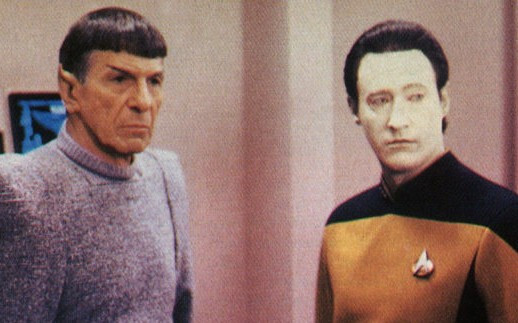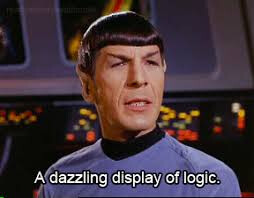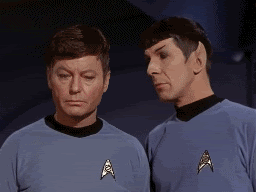My wife and I watched this movie in a few sittings over the weekend. I think it must have been the first time I’d seen it in probably a decade.
My first thought is that this movie holds up amazingly well. There are a couple special-effects shots that are pretty obviously green (or blue) screened with annoying white borders around the pieces-parts, but that’s about it. Even the CGI Genesis briefing holds up well because it was SUPPOSED to be a computer-generated simulation. Lots of the other stuff like the communicators and computer interfaces seemed generally fine and not out-of-place even in a nearly 40-year-old movie set in the future.
I guess if I were to nit-pick, the retinal scan of Kirk seems a bit quaint now that we have such stuff, and it seems a little ridiculous that a six-digit numeric password for all of a ship’s control systems could possibly be considered good security practice.
The Romulan Ale thing in the first act struck me as funny. McCoy gives some to Kirk even though it is technically illegal, and I’m sure that in 1982 it was an analogy to Cuban cigars. But McCoy’s reference to “medicinal purposes” made me think of the medical exemptions for marijuana, which I assume came long after this was filmed.
One new thing I got out of the re-watch was how the trainee crew was a character in itself. When the Reliant attacks the first time, there is a scene in the engineering bay where everyone is running around in a panic. Somehow, in the dozens of times I’ve watched the movie, I’d never heard Scotty yelling “Get back to your posts!” in the background. So I’ve always associated that scene with chaos and being unprepared, but never with inexperience or cowardice.
This time, I did see that the crew was supposed to be rising to the occasion, “Growing up faster than planned” in Kirk’s words. The later scene where the crew is marching with purpose through the halls holding tools or working with great coordination and efficiency to get everything in order before engaging the enemy did a good job or portraying their resolve and growth… even if it was all background stuff.
Another thing that stuck out for me was the poses of the opposing bridge crews. There are several scenes where people are standing around the Enterprise bridge in kind of silly spots simply so that they would be well-situated for the camera, but they always sort-of looked like there were there for a military reason. But on Reliant, there are a few shots where Montalban’s collection of Chippendale’s dancers are clustered around him very closely, like barbarians clustered at the base of their chief’s throne.
And as others have mentioned, the nautical, capital ship theme that runs through the whole production was excellent. The ships ponderously turning, sliding to a slow stop, and generally acting like things with a huge amount of mass worked exceedingly well in this movie.
One little piece of trivia that I read yeas ago: Early on McCoy asks Scotty how he is feeling, and it’s later implied that what was wrong with him was a hangover. In reality, that line is a nod to the fact that Doohan was recovering from a heart attack at the time of filming.


